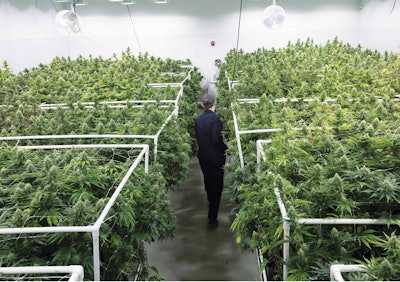As the world collectively hit pause at the onset of the COVID-19 pandemic in 2020, so, too, did mergers and acquisitions in the cannabis industry. However, as others were busy getting their bearings, a handful of companies elected to strike deals.

One company making notable acquisitions in recent months is Ayr Wellness, a vertically integrated, multistate cannabis operator based in New York—for now. With recent acquisitions in both New Jersey and Florida, Ayr (pronounced “air”) is expanding its footprint across the U.S. The company acquired Liberty Health Sciences, a vertically integrated operator in Florida, in a stock-for-stock transaction valued at $290 million, as well as Garden State Dispensary, a licensed New Jersey operator, for upfront consideration totaling $101 million—including $41 million in cash and $30 million in stock. With the addition of Florida and New Jersey, Ayr will have operations in seven states with combined populations that total nearly 73 million people.
“For Ayr, it’s always been extremely important to be in states that really matter [and] really move the needle,” says Ayr Wellness COO Jennifer Drake, who joined the company in 2018. “We’ve been very strategic about building our footprint so that we can be concentrated in the 10 or 12 states around the country that get 80% of the consumer exposure. Right now, we’re in seven of those states, so we’re not done.”
Ayr’s Florida acquisition will add 42 retail dispensaries to its operations, and the company is relocating its headquarters from New York to Florida as part of its expansion.
“Florida is an incredible opportunity,” Drake says. “We bought the fourth-largest footprint in the state in terms of the number of dispensaries. It’s a business with great bone structure that needs a little bit of fixing up, but we’re great at that. We think that [our] Florida [business], with our improvements, in a year-and-a-half or two years could be worth what our whole company is worth today in terms of market cap.”

Photo courtesy of Ayr Wellness.
As Ayr continues its expansion across the U.S., Drake says the company is better positioned for success now than it was before the pandemic. Most recently in Ayr’s Q1 2021 earnings report, the company improved its revenue by 74% year-over-year to $58.4 million. The company also reported U.S. GAAP operating loss of $8.4 million, which included non-cash and one-time expenses of $26.5 million in the first quarter. The company also expects an estimated $90 million in revenue in Q2, up 218% year-over-year and 54% quarter-over-quarter.
Part of the Ayr’s recent success stems from Drake’s prior M&A experience, including time spent with Goldman Sachs. While there are plenty of similarities between the cannabis industry and previous industries Drake has worked in, she emphasizes the importance of having good people in the cannabis industry.
[With] acquisitions in the cannabis industry, you’re really looking for a great asset, but also great people,” Drake says. “It’s not that it’s unique to cannabis, but it’s just so important in the cannabis industry. You’re always fighting to find the best talent, fighting to find the best cultivators, fighting to have the best budtenders. You really want to attract and retain the best people to your company. When you’re making acquisitions, getting a great business with even better people is the best acquisition that you can make. Because cannabis is so new and still in the process of mainstreaming, the entire world is not your oyster when it comes to your candidate pool, so it makes your team that much more precious.”
Looking forward, Drake is optimistic about the future for both Ayr Wellness and the cannabis industry as a whole, though she admits the path to a federal legalization bill “could be windy.”
“2021 and 2022 are going to be really great years for continued mainstreaming of cannabis,” Drake says. “Ultimately, we believe that federal legalization will probably happen. The timeframe is hard to determine because there are a lot of key issues that are complex that need to be decided. Things like the role of interstate commerce; if it’s federally legal, cannabis can cross state lines? What does that do to the jobs created in states? What does it do to the tax base? Those are questions that people will be asking and deciding together, and they’re really important questions. For those reasons, it’s probably going to take a little while.”

























